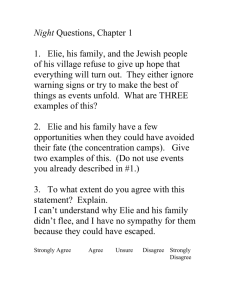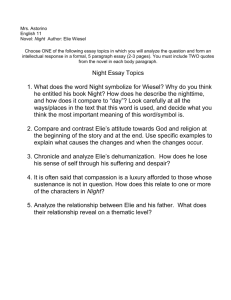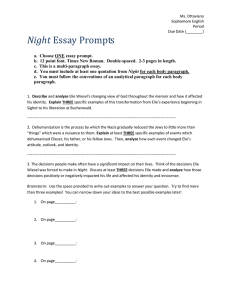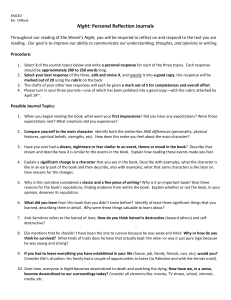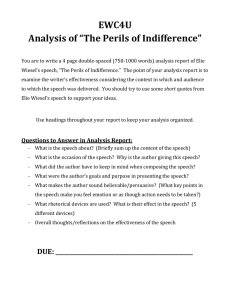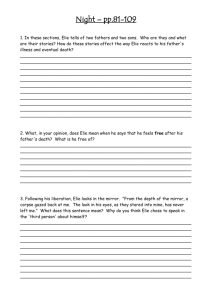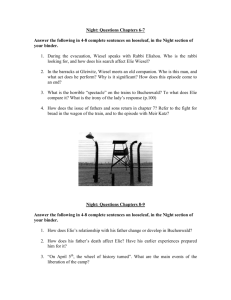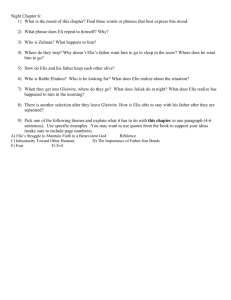Assignment - Columbus High School
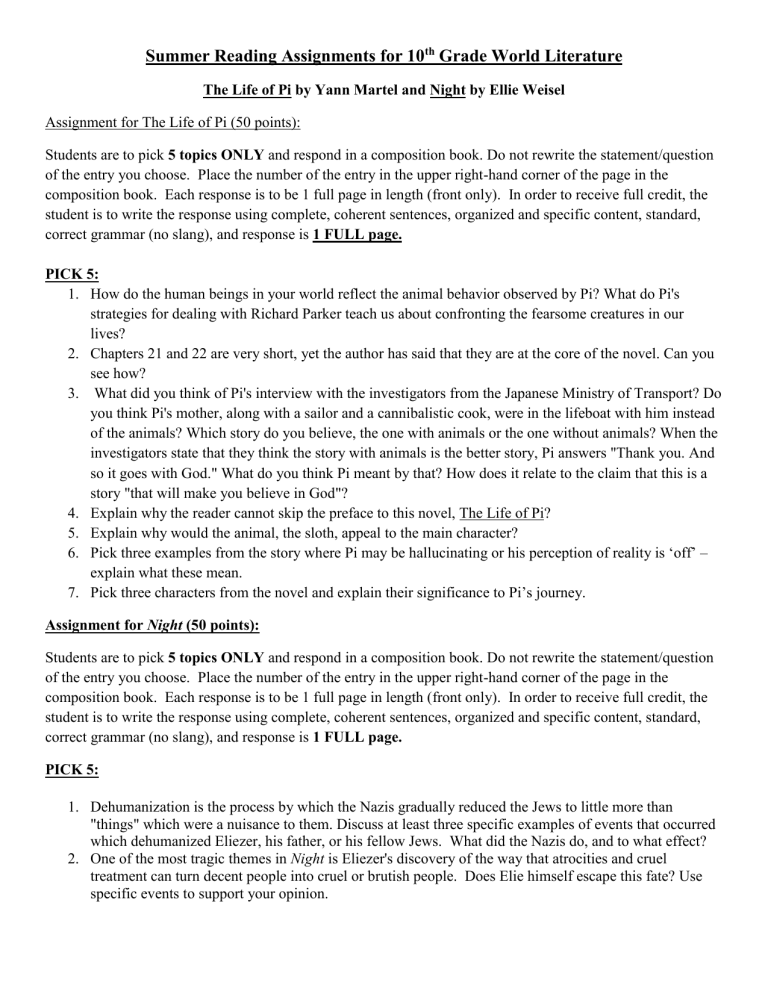
Summer Reading Assignments for 10
th
Grade World Literature
The Life of Pi by Yann Martel and Night by Ellie Weisel
Assignment for The Life of Pi (50 points):
Students are to pick 5 topics ONLY and respond in a composition book. Do not rewrite the statement/question of the entry you choose. Place the number of the entry in the upper right-hand corner of the page in the composition book. Each response is to be 1 full page in length (front only). In order to receive full credit, the student is to write the response using complete, coherent sentences, organized and specific content, standard, correct grammar (no slang), and response is 1 FULL page.
PICK 5:
1.
How do the human beings in your world reflect the animal behavior observed by Pi? What do Pi's strategies for dealing with Richard Parker teach us about confronting the fearsome creatures in our lives?
2.
Chapters 21 and 22 are very short, yet the author has said that they are at the core of the novel. Can you see how?
3.
What did you think of Pi's interview with the investigators from the Japanese Ministry of Transport? Do you think Pi's mother, along with a sailor and a cannibalistic cook, were in the lifeboat with him instead of the animals? Which story do you believe, the one with animals or the one without animals? When the investigators state that they think the story with animals is the better story, Pi answers "Thank you. And so it goes with God." What do you think Pi meant by that? How does it relate to the claim that this is a story "that will make you believe in God"?
4.
Explain why the reader cannot skip the preface to this novel, The Life of Pi?
5.
Explain why would the animal, the sloth, appeal to the main character?
6.
Pick three examples from the story where Pi may be hallucinating or his perception of reality is ‘off’ – explain what these mean.
7.
Pick three characters from the novel and explain their significance to Pi’s journey.
Assignment for Night (50 points):
Students are to pick 5 topics ONLY and respond in a composition book. Do not rewrite the statement/question of the entry you choose. Place the number of the entry in the upper right-hand corner of the page in the composition book. Each response is to be 1 full page in length (front only). In order to receive full credit, the student is to write the response using complete, coherent sentences, organized and specific content, standard, correct grammar (no slang), and response is 1 FULL page.
PICK 5:
1.
Dehumanization is the process by which the Nazis gradually reduced the Jews to little more than
"things" which were a nuisance to them. Discuss at least three specific examples of events that occurred which dehumanized Eliezer, his father, or his fellow Jews. What did the Nazis do, and to what effect?
2.
One of the most tragic themes in Night is Eliezer's discovery of the way that atrocities and cruel treatment can turn decent people into cruel or brutish people. Does Elie himself escape this fate? Use specific events to support your opinion.
3.
Eliezer and his family were targeted as Jews. To what extent did Elie’s faith define his early (preconcentration camp) life? How does his view of God change throughout Night ? How do the Jews in the concentration camp retain or observe their faith? Describe and analyze three examples of Elie’s changing faith over the course of the memoir, and explain how this change affects Elie’s identity.
4.
Upon arriving at Auchwitz, Eliezer meets a distant relative, Stein. How does Eliezer lie to Stein? What choices did Eliezer have in this situation? Was his decision morally right? Is this lie forgivable under the circumstances?
5.
Moishe returns to Sighet with horrific tales of his experiences in the Galician forest. He desperately tries to warn the townspeople about the Gestapo, but his words go unheeded. Why will no one listen to
Moishe? Why is Moishe not only ignored, but considered insane? What other opportunities do the Jews of Sighet have to receive warning or escape the looming atrocities? What motivates the Jews to ignore or disregard these warning signs?
6.
Elie Wiesel titles his memoir Night . Discuss the significance of "night" in the text. On what levels is
“night” symbolic? How is night—literally or symbolically—important to Elie’s story? How does
Wiesel develop the symbol of night?
7.
At the beginning of the memoir, we are introduced to Elie’s family. His relationship with his father is a significant element of Elie’s story. Compare and contrast Elie and his father. How would you describe their relationship in Sighet? During their time at Auschwitz? Discuss the changes in Elie and his father’s relationship over the course of Night .
8.
Elie struggles with guilt throughout the story of Night . Why does Elie feel guilty? Are his feelings of guilt justified? Elie is told in Auschwitz "Here, every man has to fight for himself and not think of anyone else. Even of his father. Here, there are no fathers, no brothers, no friends. Everyone lives and dies for himself alone." Does the need for survival lessen the guilt of abandoning loyalties? How does
Elie deal with or reconcile his guilt?
9.
Elie and the others in Auschwitz experienced incredible suffering and cruelty. Who were the bystanders to the events that occurred in Night ? Who are the perpetrators? Who are the victims in Night ? Do these roles sometimes overlap? How? Can a person be both persecutor and victim? Discuss using specific examples from Night .
10.
At the end of Night , Wiesel writes: "From the depths of the mirror, a corpse was contemplating me. The look in his eyes as he gazed at me has never left me.” Why does Elie choose to use this image? Why is
Elie unable to recognize himself? What parts of Eliezer died during his captivity? What was born in their place? How has Elie’s identity been shaped by his experiences?
All students will turn–in their summer reading assignments to their 10
th
